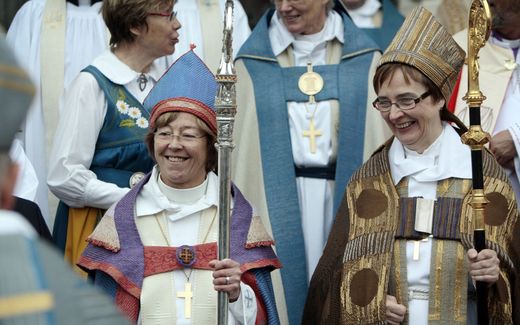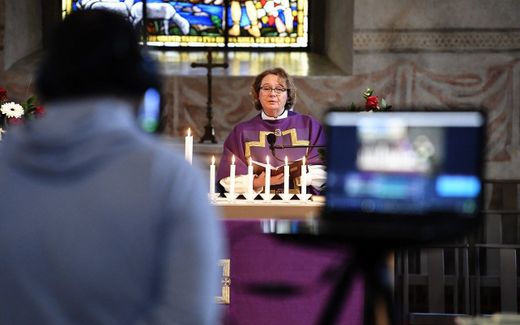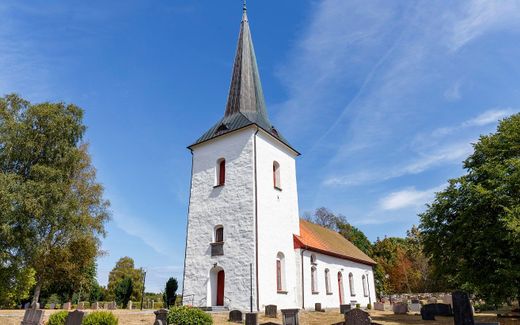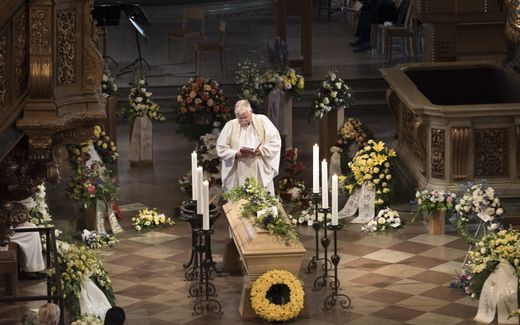Secular Sweden as a blueprint for Europe
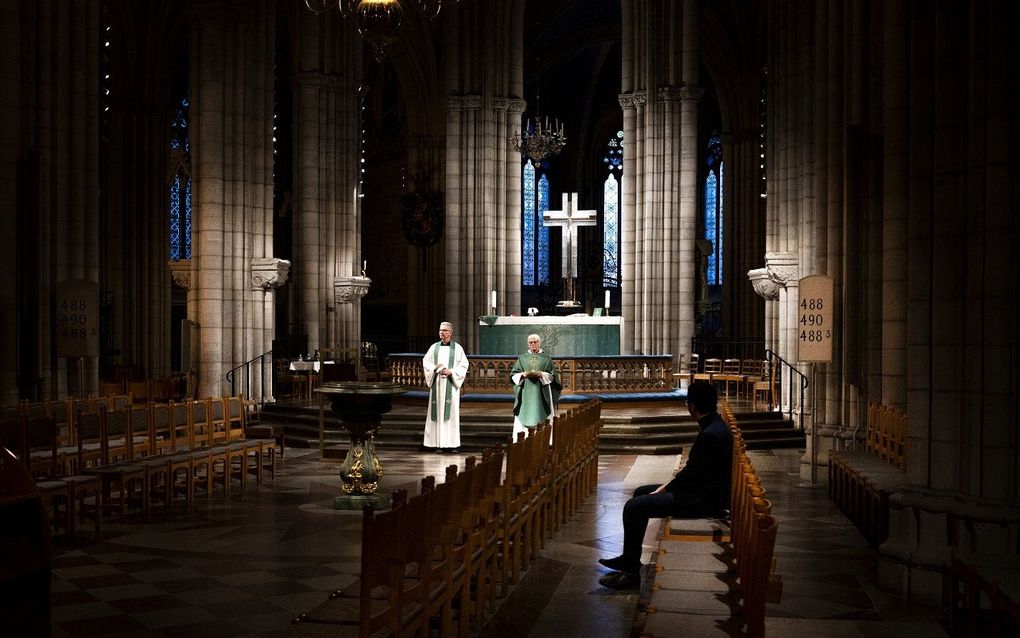
Secular values have gained influence in a large number of Swedish churches. The Church of Sweden is leading the way around left-wing themes. Photo AFP, Pontus Lundahl
Northern Europe
Sweden is one of the least religious countries on the planet. According to researcher Per Ewert, social democracy has had a major role in this. The consequences, he says, are clear: great loneliness and rising crime rates.
God no longer has the leading role in Sweden, but the individual. Social democracy has had a decisive role in this development. That is what Swedish Per Ewert, director of the Clapham Institute, the Scandinavian country's largest Christian think tank, believes. He received his PhD on Monday on the role of social democracy in Sweden's secularisation.
“The land that forgot God” is what Ewert’s book, a popularised version of his dissertation, is called. No country became as secular and individualistic as Sweden, according to the Inglehart-Welzel's Cultural Map, an influential diagram that makes values across the world 'measurable'. For Ewert, that was the reason to look at the cause of these developments. "Secularisation also occurs in other countries, but in Sweden, it is all just a bit more extreme."

In many European countries, social democracy played an important role after World War II. This parliamentary form of socialism stood for a society with more equality. This made social securities such as pensions possible. Nowhere in Europe was this influence as strong as in Sweden. From 1932 to 1976, for 44 years, the Social Democrats were firmly in power. That changed in 1976. After some scandals and setbacks, the party remained the largest in these elections. Still, several other parties formed a moderate government.
A major reason why the Social Democrats stayed in power for so long was World War II, Ewert explains. "Because Sweden remained neutral during the war, it was in good economic shape after the war. That gave voters confidence in the leading party."
On the one hand, social democracy gave stability. But on the other hand, it had huge consequences for Swedish Christianity. In the socialist worldview, based on the ideas of Karl Marx, the Church is regarded as an institution that oppresses the working class, Ewert explains. The Church offers a different answer to social problems than socialism. Christianity works from spiritual values, and socialism from material principles.
Anti-Christian
Already from their founding in 1889, the Swedish Social Democrats were anti-Christian. Their ideologue, Karl Marx, described Christianity as the "Opium of the People". According to Marx, Christianity would make citizens resign themselves to their fate instead of working for a better future. The Social Democrats wanted to separate Church and State from the start to break this wait-and-see attitude. In addition, they wanted to change the Swedish Church itself.
State church is open to influence of society
Under the spell of the Reformation, King Gustav I of Sweden broke ties with Rome in the 16th century. He founded the Church of Sweden, which embraced Lutheranism in 1593. Until 2000, the church had as a state church close ties with the Swedish government.
As a state church, the Swedish church adopted a structure similar to how the state is organised. People could vote for candidates from political parties for church bodies. This close relationship between church and state makes state churches generally more open to influences from society.
Especially in modern times, state churches appear vulnerable to societal influence more than the other way around. Before 2000, more than 80 per cent of Swedes were members of the state church. Because of the open elections, the church became a reflection of society. This enabled the power of social democracy in the church.
In the 20th century, the church came under the influence of liberal Protestantism, a movement in which believing based on one's views is central. In 1958, the priesthood was opened to women. Since 1994, the ministry has been out of reach for men who refuse to work with female ministers.
In 2000, the Swedish church severed its ties with the government. Then Culture Minister Carl-Einar Nordling welcomed it: "It is founded on the ideology of one country, one people, one ruler. You only have to say that to feel how foreign it is in today's society."
Until 2000, the Swedish Lutheran Church was a state church. Not the synod, but parliament had a say in church affairs. According to Ewert, their parliamentary majority allowed the Social Democrats to exploit their power. Church bodies were elected from political lists. "The social democrats brought political elections to the Church. So with a political agenda, the Church secularised from within. Protests by bishops and the General Synod were to no avail; because as it was a state church, parliament had the final say."
Classroom
Although Sweden is not the only country where social democracy gained a foothold in the 20th century, it was the country where Christianity was most fiercely opposed, says Ewert. In his study, he compares Swedish social democracy with that of Norway. "In both countries, the debate raged in the 1960s about whether Christianity should leave the classroom. Whereas the Swedish government pushed this through against the people's will. In Norway, the government joined the people’s will."
The Swedish Social Democrats were thus more hostile than the Norwegian ones, states Ewert. According to him, this was partly due to the people within the party. They were more aggressive than their Norwegian colleagues. He quotes the Dutch political scientist Prof Hans Keman, who compared social democracy in different countries. "Keman shows that social democracy in Sweden appeared in one of its most leftist forms."
The consequences are directly felt in the Swedish Church. Although Church and State severed ties in 2000, secularisation has not passed the Church. The Church of Sweden is at the forefront around left-wing issues such as gay rights and climate but speaks little about classic questions of sin and grace.
According to Ewert, secularisation ought to be more seriously analysed in Swedish churches. "We see that in a large number of churches, secular values are influential," says Ewert, an Evangelical Free Church member. "The Church, therefore, needs to examine itself and look at its values objectively. Is this the way you want to be as a Church in the future?"
Crime
On the social front, the Swede's secularisation and individualisation is not without consequences. There is a loss of meaning and morality and a rise in loneliness and crime, signals Ewert.

He is not the only one dissatisfied with the current situation in the Nordic country. Although the Social Democrats remained the largest party in the September elections, power shifted to a right-wing minority government. "Young voters, in particular, opted en masse for the right. This shows dissatisfaction with the left-wing progressivism that has ruled Sweden for so long," says Ewert. According to him, these election results are a reaction to rising crime rates "but possibly also to the ideology itself."
Ewert thinks the September elections are a turning point for Sweden, says Ewert. "This is a good moment to look back together and discuss which values we want to face the future with."
Other European countries should ask themselves the same question. Sweden, according to Ewert, is a good example to evaluate which way a country should move. "If countries want an individualised society, they should look at Sweden and decide whether they would be satisfied with that. Then they can remove religion from society and put the individual at the centre."
As an alternative, Ewert mentions the social democrat Tony Blair, British prime minister from 1997 to 2007. "He was a Christian politician who did not express his faith while in office. But he did make it clear that a society without Christian values ends up in isolation and lack of solidarity. Most people would not call that a good society."
Related Articles


